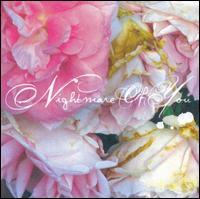Back when I wrote the review for Action Action's Don't Cut Your Fabric To This Year's Fashion, I began it with a bit of a look on the post-punk trend that had taken over the mainstream that year. Rightfully so, my clichéd slant on it was called out in the comments section with one particularly bold fellow referring to the intro as journalistic laziness, and this was true; I was admittedly relying on well-known information anyone with access to an issue of Rolling Stone could read up on. While Action Action certainly fit into the mold I'd presented at the time, they don't quite conform to the cavity slowly being secretively infiltrated by a number of mates in their subgenre. Sure, there are admittedly a vast number of current acts drawing upon the post-punk / alternative pop/rock of the 80's, but with one glaring adjournment to the former's credit: Musically, it's pretty sunny. Albums like Franz Ferdinand's self-titled record and Hot Hot Heat's last two efforts draw upon Interpol / Joy Division and the Cure respectively, no doubt, but those influences in particular were famous for their astonishing moodiness and captivating way of channeling depression at its truest, most raw form. What they didn't know, however, was that there was a small flood of bands that would take their sound 20 some odd years later and alter it from bleak spheres to sheer musical cheerfulness. Hot Fuss and Franz Ferdinand are fun. HHH's Elevator sounds happy. It's albums like these and Nightmare Of You's self-titled debut full-length that are sorely pushing the point that an alterior mood is rightfully helping prevent the dismissal of an entire movement as straight nostalgic rehashing.
Nearly immediately after Long Island's pop-punk stalwarts the MovieLife called it quits in the fall of 2003, talk of a new project from guitarist Brandon Reilly broke. The project, Nightmare Of You, was one that departed far from the melodicore-inspired stylings of his former band, instead drawing upon a variety of Britsh indie acts from the 80's including Morrissey and the Smiths, the Cure, and Echo & The Bunnymen. Hell, I'm sure it's no coincedence the band's name is also some of the first words sung in the Cure's "Kyoto Song." It's Reilly's first endeavor into vocally fronting a band, and it's a superb job he does. Sure, it's a rare moment when we don't hear a soothingly English croon that's obviously heavily influenced by Morrissey (Reilly even refers to a certain household object as a "telly" in the closing song), but what Reilly does, he does it well.
An expected juxtaposition is presented here with Reilly's relatively dark songwriting and the aforementioned musically upbeat vibe of the record. "Why Am I Always Right?" sounds sickly chipper with its passage of "and as you slept away the day in my bedroom / I found a criminal use for your pillow / I love you terribly, I swear that this is true / but I just can't stop my hands from smothering you;" luckily, this murder scene seems more tasteful when realized against the record as one of few violent occurrences, and its vague narration proves the first-person could be either gender, preventing potential labels of misogyny. It's a fantastic track altogether, with Reilly even employing Morrissey's technique of abruptly transitioning to brushy acoustics at the chorus. "Ode To Serontin" is a great, bouncy gallop of a track. "My Name Is Trouble" and the slow-paced "Marry Me" prove the band's already carrying themselves with a bit of ambition to branch out. The former is a bit kitschy in its new wave, almost club beats, but its Postal Service-esque blips at the bridge following a Faint-like shake is a nicely dancey break in the record for the anxious hipsters, while the latter clangs with a pure twang and country guitars, and somehow, even with Reilly sticking to his more dramatic vocal guns and thus choosing to forgo the requisite honky tonk drawl, it works. Although he can get a bit overzealous at select points, like his downright laughable velociraptor screech in the short bridge of "The Studded Cinctures," his style's well-expressed.
Perhaps the one personal issue that Nightmare Of You hides is that any demo the band had previously posted online -- and there are certainly a handful -- is better than its finished version on the album. True, Reilly's voice sounds pleasantly facetious singing the line "so stop dragging your feet behind" in "Dear Scene, I Wish I Was Deaf," but it seemed to work best and rather confrontational when it resonated with anger as it did on its original form. There was a seemingly perfect sound quality to the 5 original demos put up in January 2004 on the band's website, and it's tracks like the unfortunately titled "I Want To Be Buried In Your Backyard" (formerly known as "Yuengling," and likely changed due to copyrights on the popular beverage) that just seemed more personal and as a result more effective in its earlier, more stripped down setting. However, I'm harping on an opinion that's virtually a non-issue for new listeners, and that's likely to be the majority of NOY's fanbase come several months, especially since producer Brian McTernan's done a fine job when judging the record on its own merits.
The five original demos posted by Nightmare Of You were amazing songs, and that's a word I use scarcely. It's hard to bring that same abundant consistency to a full, proper record, but with Nightmare Of You's self-titled debut, they've nearly succeeded. It's an exceptional album and a bit hard to believe its status as a first official LP, but regardless a piece of great, poetic songwriting and an original approach to a sound revolutionized by a stable of artists now a cult phenomneon. If the current era's considered the newest wave of said style, consider Nightmare Of You at the forefront of it.
STREAM
Nightmare Of You
